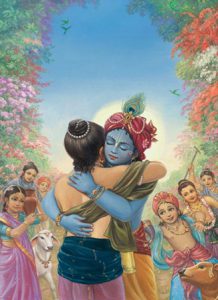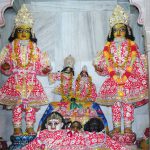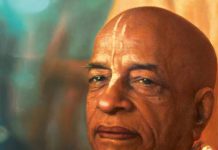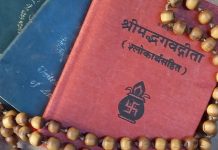 by Srila B.R. Sridhara Deva Goswami, from the introduction of The Loving Search for the Lost Servant
by Srila B.R. Sridhara Deva Goswami, from the introduction of The Loving Search for the Lost Servant
In Brhad-Bhagavatamrta, it is written that once, as Krishna and the cows were returning from the Vrindavana forest at the end of the day, a boy had just attained spiritual emancipation and entered Vrindavana as a cowherd boy (sakhya rasa). Seeing his long lost servant, Krishna embraced him and both of them fainted in ecstasy.
All of Krishna’s other cowherd friends were astounded, thinking, “What is this! Krishna has lost his senses by embracing this newcomer? How is it possible!” Then, as all of the cowherd boys looked on astonished, Balarama came to Krishna’s relief and somehow managed to rouse him. Then Krishna addressed his friend with great affection: “Why did you stay away? Why have you been living away from home for so long? How was it possible for you? How could you bear my separation? You left me, and you have been passing life after life without me? Still, I know what trouble you took to return to me. You searched for me everywhere, and went to beg from house to house, and you were chastised by many, ridiculed by many, and you shed tears for me. I know all these things. I was with you. And now, after great trouble, you have again come back to me.” In this way, Krishna addressed his long lost servant and welcomed him. And when Krishna returned home, he took the newcomer by his side to take prasadam. In this way, a new recruit is earnestly welcomed by Krishna Himself.
So the Lord’s search for his lost servants is a loving search; it is not ordinary but from the heart. And the Lord’s heart is not an ordinary heart. Who can estimate what type of search he is engaged in? Although he is full in all respects, still he feels pangs of separation for every one of us, however small we may be. In spite of his supreme position, he has room for us in a corner of his loving heart. This is the nature of the infinite.Such an absolute autocrat, absolute good is Krishna.
An autocrat is not under law. It is not that if Krishna gives himself to one, then another will be lacking. The infinite is not like that; rather there is an infinite supply at his command. So he is the emporium of rasa (akhila-rasamrta-murtih). And he is searching for his lost servants, to bring them home.
Otherwise we have no hope. Our solace, our consolation in life, is that ultimately we are under the care of such a loving Lord. Krishna’s friends think, “What do we care for others? We have our Krishna, our friend.” That sort of inner encouragement, that desperate encouragement, comes from within. “Krishna is there, he is our friend. What do we care about anything? We can take poison, we can jump on the head of that big serpent Kaliya, we can do anything. With Krishna behind us, what do we care?” This sentiment is expressed by Bhaktivinoda Thakura in his Saranagati:
raksa koribo tuhun niscaya jani pana korobun hama yamuna pani
“Fearless and confident of your protection, I shall drink the waters of the Yamuna, whether they are poisoned or not. I am your property. You must take care of me; You can’t leave me.”
kaliya-dokha korobi binasa sodhobi nadi-jala badobi asa bhakativinoda tuwa gokula-dhana rakhobi kesava! korato jatana
“Although the Kaliya serpent’s venom has poisoned the Yamuna’s waters, I know that poison will not act. Your presence will cleanse the waters and so increase our confidence in your protection. Bhaktivinoda is now the property of Gokula, your holy abode, O Kesava. Kindly protect him with care.”
How are we to enter into such a loving relationship with the Lord? Through the grace of Sri Gauranga. One devotee has said, “If Gauranga had not come, how could we live? And who would inform us about our ultimate prospect in life?” We have such a great prospect. And yet, without Gauranga, who would have come to inform us that we have so much wealth within? And Sri Gauranga says, “You do not know, but you have such a great magnitude of wealth.” His coming to inform us of our prospect is like the astrologer who reads a poor man’s horoscope and tells him, “Why are you living a poor life? You have immense wealth buried underground. Try to recover it. You are so great and your guardian is so loving and so high, and yet you are wandering like a poor fellow in the street? What is this! You are not helpless; it is not that you have no guardian. You have only to remember your merciful guardian.” In the Srimad-Bhagavatam (11.5.32), where the Kali-yuga avatara is mentioned, we find evidence of the advent of Sri Caitanya Mahaprabhu. There it is said:
krsna-varnam tvisa ‘krsnam, sangopangastra-parsadam
yajnaih sankirtana-prayair, yajanti hi su-medhasah
“In the age of Kali, persons of great piety and intelligence will worship the Lord as Sri Caitanya Mahaprabhu. He will appear in a golden form chanting Krishna’s name, accompanied by his associates and entourage.”
After that, there are two other verses about Sri Caitanya Mahaprabhu:
dhyeyam sada paribhava-ghnam abhista-doham, tirthaspadam siva-virinci-nutam saranyam bhrtydrti-ham pranata-pala bhavabdhi-potam, vande maha-purusa te caranaravindam.
Srimad Bhagavatam (11.5.33) explains here,
“That same personality who came as Ramacandra and Krishna has again appeared. He has come to direct us to the real fulfillment of life. He is drawing the sweetest nectar from above for the sake of everyone. Meditate only on him and all your troubles will be finished. He purifies all holy places of pilgrimage and great saintly persons by his touch and by his sankirtana. He draws the highest things down from the highest plane. And even Brahma and Siva, puzzled by his noble gift, will begin to praise him. They will eagerly aspire to take shelter under his lotus feet in surrender. The pains of all who come to serve him will be removed, and their inner necessities will be fulfilled. And he will take care of those who take shelter of him; they will be given protection as well as everything they may need. In this world where mortality rules, where we are continually experiencing the undesirable changes of repeated birth and death, in this area where no one wants to live, a great ship will come for us and take us within, and carry us away from this unpleasant position. Let us fall at the feet of that great personality who comes to give us the highest nectar.”
tyaktva sudustyaja-surepsita-rajya-laksmim, dharmistha arya-vacasa yad agad aranyam
maya-mrgam dayitayepsitam anvadhavad, vande maha-purusa te caranaravindam
“O Supreme Lord, you gave up the goddess of fortune and her great opulence, which is most difficult to abandon and is sought after even by the gods. In order to perfectly establish the principles of religion, you left for the forest to honor a brahmana’s curse. To deliver the sinful souls who chase illusory pleasures, you search after them and award them your devotional service. At the same time, you are engaged in a search for yourself, in a search for Sri Krishna, Reality the Beautiful.”
This verse generally applies to Lord Ramacandra, who left his kingdom, and after going with Sitadevi to the forest to discharge the duties designed by his father, chased after the maya-mrgam—the golden deer. Srila Visvanatha Cakravarti Thakura, however, shows how this verse also applies to Sri Caitanya Mahaprabhu. He says that the word maya-mrgam means that Sri Caitanya Mahaprabhu ran after the souls that are enveloped by maya or misconception. The word maya-mrgam, when applied to Ramacandra, means that he ran after Marici, who had taken the form of a golden deer. When applied in the case of Sri Caitanya Mahaprabhu, the words maya-mrgam anvadhavat mean “He chased after those souls who are in illusion in order to deliver them. He ran in pursuit of the fallen souls as a savior, to deliver them from maya or illusion.” Visvanatha Cakravarti Thakura has also given another interpretation: he says that dayitaya ipsitam means “it is desired by the beloved,” that is, the search for Krishna. In this way, he identifies two qualities in the Caitanya avatara: he relieves the fallen souls, and he searches out Krishna in the mood of His beloved (dayitayepsitam anvadhavat). Inspired by the mood of dayita, his beloved, Srimati Radharani, he ran after the souls in bondage to deliver them. Here we find the scriptural reference, the seed of this conception. He is in quest of the lost souls, absorbed in a loving search for his lost servants. And throughout the whole life of Sri Caitanya Mahaprabhu and his other self, Nityananda, it is very clear that they, being the Supreme Entity themselves, are hunting after the fallen souls to deliver them. This will be the backbone of our conception of the Lord’s loving search for his lost servants.










